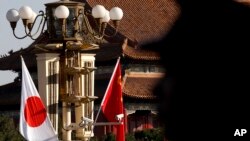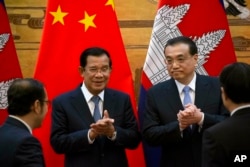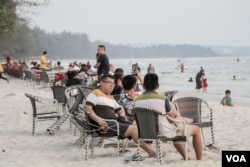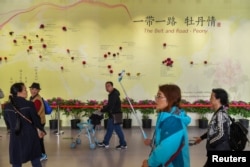When western governments were busy condemning a sweeping political crackdown in Cambodia that saw the ruling Cambodian People’s Party win all of the seats in parliament during a poll last year, Japan remained tight-lipped.
There have been calls for Japan, one of the kingdom’s main donors and chief architects of the peace deal 28 years ago that ended the civil war, to condemn the Cambodian government over its crackdown on critics, opposition politicians, and media outlets critical of the regime.
But Japan chose not to act, with China cited as the reason. Amid its political break from the west, the Cambodian government, led by long-serving Prime Minister Hun Sen, has been seen as relying more and more on Beijing for political and economic support.
In his recent visit in April to Beijing, Hun Sen secured an assurance from the Chinese leadership that it would help Cambodia in the event that the European Union suspended Cambodia’s export privileges.
Sek Sophal, a researcher for Japan’s Ritsumeikan Center for Asia Pacific Studies, questioned China’s shielding of the Cambodian regime, citing past experience in the event of the west’s sanctions against Myanmar under the military dictatorship.
“Japan does not want the scenario [of Myanmar] to take place in Cambodia that it tries to use economic engagement and market expansion to avoid or put a brake on the process of Chinese monopolization in Cambodia,” he told VOA Khmer.
Hun Sen was among the leaders attending the second Belt and Road Forum in Beijing last month, returning home with several new deals with China, including an agreement for China’s tech firm Huawei to establish a 5G network in the country and a fresh $90-million package of military aid.
But Hun Sen is also visiting Japan later this month, where he is expected to meet the Japanese leadership while attending the Asia Future Forum in Tokyo organized by Japanese media corporation Nikkei.
Cambodia is also seeking to boost the number of annual Japanese arrivals to 300,000 next year while Chinese tourists made up to one third of Cambodia’s 6.2 million foreign visitors last year.
Through Tokyo’s Japan Inc scheme aimed at rivaling Chinese investment in Southeast Asia, Cambodia is set to be one of the region’s top destinations for the arrival of Japanese companies.
Pich Charadine, Senior Research Fellow at the Cambodian Institute for Cooperation and Peace, said Japan’s continued engagement with Cambodia were “perceived to counterbalance Chinese influence in Cambodia.”
China is investing heavily in Cambodia. The influx of investments is transforming Sihanoukville, Cambodia’s foremost port city, into a hub for casinos and Chinese tourists, creating both opportunities and resentment among locals.
Cambodia is trying to align its development master plan to China’s multi-billion Belt and Road Initiative. Under the scheme, China is financing the construction of new airports in Siem Reap and Phnom Penh and an expressway linking Phnom Penh and Sihanoukville.
As Cambodia’s main source of investment, China holds half of Cambodia’s $7 billion external debt. And Japan can somehow reduce the risks in absent or with limited western engagements, Charadine added.
“Amid major power play (i.e. the U.S. versus China), Japan holds a very strategic importance to Cambodia that we are not 'kowtowing' to China,” she told VOA Khmer in an email. “We still hold Japan dear to our hearts.”
This highlights broader Sino-Japanese competition in Cambodia and in Southeast Asia, which can be observed through competition running from the infrastructure investments to wooing countries along the Mekong River, where Japan has its Japan-Mekong Cooperation and China has its own Lancang-Mekong Cooperation scheme.
The competition between China and Japan for regional hegemony have moved to a more open and direct sphere in recent times, said Chheang Vannarith, president of the Asian Vision Institute.
“Japanese leadership in recent years choose to speak straightforwardly about the security threats imposed by China’s rising influence in the region that concerns Japan,” Vannarith said.
Such Sino-Japanese rivalry could not be more apparent than in the scene of two bridges connecting Phnom Penh to its eastern district of Chroy Changvar – one Chinese and another Japanese.
Running on a quay just below the two bridges the so-called Japanese buses and Chinese buses can be seen loading passengers through Phnom Penh’s congested streets after the two foreign governments subsequently gifted a total of 240 buses to boost the public transportation system in Cambodian capital.
However, Bradley Jensen Murg, a political scientist at Seattle Pacific University, said that Japan’s approach to infrastructure investments tends to be more rules-based and helps connect Cambodia better to multilateral economic engagements.
“Moreover, Chinese support through BRI appears to be much more focused on linking Cambodia to Yunnan, rather than integrating Cambodia to the economies of the sub-region as a whole. At the end of the day, Japanese and Chinese aid are qualitatively different entities,” he said.
Winning Hearts
On the other hand, Japan upholds a longstanding position that China may find it hard to replace when it comes to Cambodia. Analysts said Japan’s preference for backstage diplomacy and avoidance of public criticism is aligned with the Cambodian government.
But the calls for Japan to change its approach have not ceased.
In March Human Rights Watch and Japanese advocate Teppei Kasai wrote a commentary urging Japan to “stop acting like China” in response to Cambodia’s crackdowns.
“Japan is fighting a losing battle for Hun Sen’s support. Japan can’t outspend China or deliver sweetheart contracts to Cambodia, yet its overt and clumsy attempts to ingratiate itself have led to a backlash among Cambodian activists, who see Tokyo selling out democracy and human rights to maintain a friendship with a dictator,” they added.
Neither the Chinese nor Japanese embassies in Phnom Penh responded to VOA’s request for comment.
In Cambodia, however, Japan has outperformed China when it comes to trust and confidence, Vannarith added.
“Though China is leading when it comes to aid and investment, China will find it hard to win the hearts and minds of Cambodian people, which is categorized as the most important long-term [factor for] competition."
The Seattle-based expert Jensen Murg said that Cambodia had to pay less political costs when it came to Japanese aid.
“Despite Japan's deep commitment to the region through the New Tokyo Strategy, it is unable to match China's Belt and Road Initiative on a dollar for dollar basis,” he wrote.
“However, an active, engaged Japan -- working together with other donor states -- can serve to offset over-reliance on Beijing. Japan's continued engagement with Cambodia is essential if dependence is to be avoided.”










